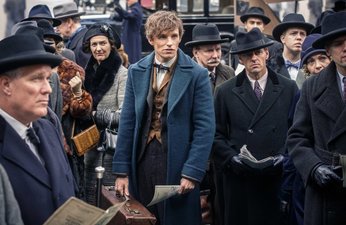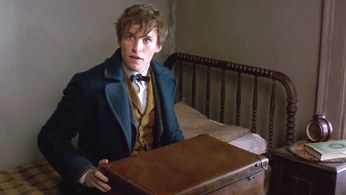Written by Kate McHargue Let me start this article by reiterating that a fundamental belief of feminism is gender equality. This means that men and the issues that affect men are part of the movement. So the reason Newt Scamander is a feminist film icon is because he is a refreshingly complex representation of a male lead and what it means to be a hero. While other male action heroes are ‘macho’ or ‘charismatic’, Newt is soft spoken, awkward, and saves the day not with his brains or brawn but with his compassion for all living things. While the villain, Graves/Grindelwald, is the very model of toxic masculinity (violent, vain, and power hungry), Newt is the polar opposite. He is gentle and abhors violence in all its forms. He is awkward and unsure of himself but comfortable in his passion in caring for and rescuing magical creatures. He has no desire to conquer and no belief that he is superior. He is a model to any man who has never seen himself in the suave hero. One of my favorite YouTubers, Pop Culture Detective, did a long and in depth analysis of just how different Newt is from the archetypal male hero and I highly suggest checking it out. He examines the above mentioned traits that Newt possesses and how this dismantles traditional and toxic representations of masculinity. But while Pop Culture Detective maintains that Newt is not being feminine so much as he is simply showcasing a different form of masculinity, I believe that Newt as a character goes further and is actually dismantling the dichotomy of gender roles that says you must be either masculine or feminine. He blurs the lines and operates on a spectrum, providing a role model that is neither masculine or feminine. He operates somewhere in between as both, just as most people do, even if society insists on categorization and either/or dichotomies. In the first shot of Newt we see him whispering reassuringly to the creatures in his case. We immediately understand that he has a bond with them and his first characterizing quality is his ability to nurture. This already is a departure from traditional masculinity and a move towards traditionally feminine qualities. Newt’s gift for compassion and nurturing becomes more pronounced as we see him struggle to save Credence, the abused boy who is host to an Obscurus. While others seek only to kill Credence and the Obscurus or to use this dark power for their own ends, Newt is concerned with saving the innocent boy from being tormented and hunted. He isn’t the hero because he slays the monster or kills the bad guy, he is the hero because he tries to protect and preserve an innocent life. And him failing to save Credence is another mark of his difference from traditional heroes. He is a flawed human who can only do so much in the face of evil. And in this way, Newt is already more relatable and complex than most male leads we’ve ever seen.  We also see Newt interact with several people (muggle and wizard alike) and the ease he has with his creatures is nowhere to be seen. He is not confident or charming around people and struggles to communicate or connect. He even marvels at how people immediately like and respond to his friend Jacob and when Jacob says, ‘Well, I'm, uh, I'm sure people like you, too, huh?’ Newt admits that he is rarely well liked and thus prefers the company of his creatures. In a world that so often tells men to never admit to flaws or insecurities, he is a man who does so without shame or embarrassment and, even more amazingly, he confesses this to another man in friendship. And Jacob returns this emotional vulnerability. At the film’s close Jacob asks Newt why he kept him around through the adventure. Newt replies that it is because Jacob is his friend and this brings Jacob to tears. The moment is not framed as anything but the genuine friendship and care that these two men feel for one another. And we see this emotional vulnerability countless times throughout the film. We see the depth of Newt’s fear that people will harm his creatures and the heartbreak he feels as he says goodbye to his friends. There are no quippy one liners or jokes to hide his feelings. He instead expresses them freely, albeit in his rather awkward and mumbling way. And while other films and male leads tend to use men expressing emotions for comic relief or ploys to garner female attention, Newt is a character that is refreshingly free from this kind of rationalization of male emotions. They are not a punchlines or a pick up lines. They are real and honest expressions of his feelings. The best part about Newt as a character in this film is that no one seems to try and police his masculinity and femininity. Sure, Graves/Grindelwald tries to have him executed and the MACUSA certainly don’t understand his connection with his creatures but none of this is because he is ‘odd’ or not the typical male. And even though the MACUSA believe his creatures and his connection to them could be dangerous, it is ultimately his understanding of these magical creatures and their trust in him that save the city and reveal Grindelwald for what he really is. Once again, Newt’s traditionally feminine qualities are framed as strengths rather than weaknesses and do not inhibit his ability to be, present, or feel masculine. Where this all gets really interesting is the way in which Newt and other characters like him will break down the barriers between masculinity and femininity. With enough time and enough diversity in characters, the line between what is masculine and what is feminine will blur. We see it already happening in real life. The societal shift towards acceptance of trans individuals and gender fluidity is slowly breaking down the dichotomy of gender that has policed what men and women and individuals who don’t fit those boxes are allowed to do and feel. And these shifts exist in a cycle. The more positive representations in popular media, the more inclusion and acceptance in real life, and vice versa and on and on. Newt is certainly not the first male lead to have feminine qualities and he arguably is not the best. But he is the male lead in a major blockbuster franchise that appeals to a large audience (geek or otherwise) and therefore has a powerful platform for change. Children see a hero who is emotional and kind, brave and loyal, and doesn’t fit the stereotypes that Hollywood so often falls back on. Adults who have already been conditioned in gender policing see a hero that breaks the mold and reminds them there is no right or wrong way to express yourself and connect with others. As for me, I see a feminist film icon that challenges the norms and smashes the patriarchy and at the end of the day, that’s the best kind of feminist film icon there is.
0 Comments
Leave a Reply. |
Archives
March 2025
|
|
© 2012-2025, Nerds That Geek LLC.
All Rights Reserved. |
uWeb Hosting by FatCow


 RSS Feed
RSS Feed